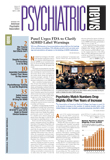At Cleveland's West Side Market, fourth-year psychiatry residents from Case Western Reserve University/University Hospitals of Cleveland might be found bargaining with the vendors for the best price on a pineapple.
“The record is a quarter,” said Residency Program Director William Campbell, M.D., M.B.A.
The historic farmers' market at 25th Street and Lorain Avenue in downtown Cleveland attracts hundreds of shoppers daily from all over the greater Cleveland area, but Campbell's pineapple-seeking residents are honing their negotiating skills—a homework assignment that is part of a unique 12-week seminar for PGY-4 residents titled “The Business of Medicine.”
Campbell believes trainees will look back on the practice gratefully when it comes time for them to negotiate with managed care companies and employers.“ Negotiating skills are like any other skill set,” he said.“ If you learn the techniques and practice, you can get very good at negotiating deals.”
Campbell described the seminar and outlined the rationale for teaching residents the business of medicine at this year's annual meeting of the American Association of Directors of Psychiatric Residency Training (AADPRT) in San Diego.
“Psychiatrists can get themselves into a lot of trouble if they don't understand basic business concepts,” Campbell said. “Residency graduates are going to face these issues one way or another.”
The seminar at University Hospitals of Cleveland consists of weekly 75-minute classes scheduled during the first three months of the PGY-4 year. Each of the 12 seminars is an instructional module based on a key business topic relevant to the practice of psychiatry. The Socratic method of guided questioning is used as the primary instructional model.
Separate classes are devoted to the following topics:
•
Managed care organizations
•
The pharmaceutical industry
•
Professional liability insurance
•
Psychiatric practice management
•
Legal and risk management considerations for psychiatrists
Three of the seminar's 12 weeks are spent on managed care contracting. (Campbell will also be teaching a continuing medical education course at this year's APA annual meeting in Toronto titled “Managed Care Contracting for Psychiatrists.”)
At the AADPRT meeting, he showed attendees an instructional managed care provider contract with language culled from executed contracts incorporating more than 100 “landmines”—seriously problematic contractual language covering issues such as restrictive covenants, hold-harmless clauses, and the managed care company's definition of “medical necessity.”
“These were contracts that people actually signed,” he said.“ Many times the only thing the psychiatrist wants to know is how much he or she will be paid. So they flip through a 15-page contract looking only for reimbursement rates.
“Oftentimes the reimbursement is reported as a percentage of the Medicare rate,” he said. “But what people don't know is that this rate may be a `blended' rate, an average based on rates for all psychiatric CPT codes. The managed care companies know which codes a psychiatrist uses the most, and they discount these and bump up the others.
“If we don't help our residents learn these basic concepts, they will needlessly get into a lot of trouble,” he said.
So, too, residents need to know their way around health benefit packages—a skill they need when talking to their patients about treatment plans.
“If you know a patient only has 20 visits a year, though you believe the patient needs to be seen once a week, that's something you need to talk to the patient about,” he said. “And if the patient is unable to pay for services beyond the limits of the health plan, you need to talk to the patient about negotiating a fee with you or transferring the patient to another provider where continuity of care can be assured.
“A service you should provide as a psychiatrist is helping patients understand what their short- and long-term out-of-pocket costs are likely to be for the care you feel they need to have.”
Campbell said residents also need to be introduced to the issues surrounding physician interactions with the pharmaceutical industry and pharmaceutical sales representatives.
“Most residents, and many practicing physicians, probably have no idea how much data the pharmaceutical industry actually has on them,” he said. “They know prescribing patterns and a lot of background information [about a physician]. Whatever your view is about whether residents should have contact with pharmaceutical representatives during training, at the end of the day when they complete their training, they are going to interface with these representatives one way or another.”
Campbell's residents in the “The Business of Medicine” seminar receive assigned readings and take part in group discussions and case-based learning exercises. Campbell is now developing a “Jeopardy” game in which the relevant business topics will be used as the categories.
The residents also receive homework, like the assignment to visit the farmers' market and come back with the lowest price on an item of produce.
“The best way to learn a new skill is to put it into action,” Campbell said. ▪
